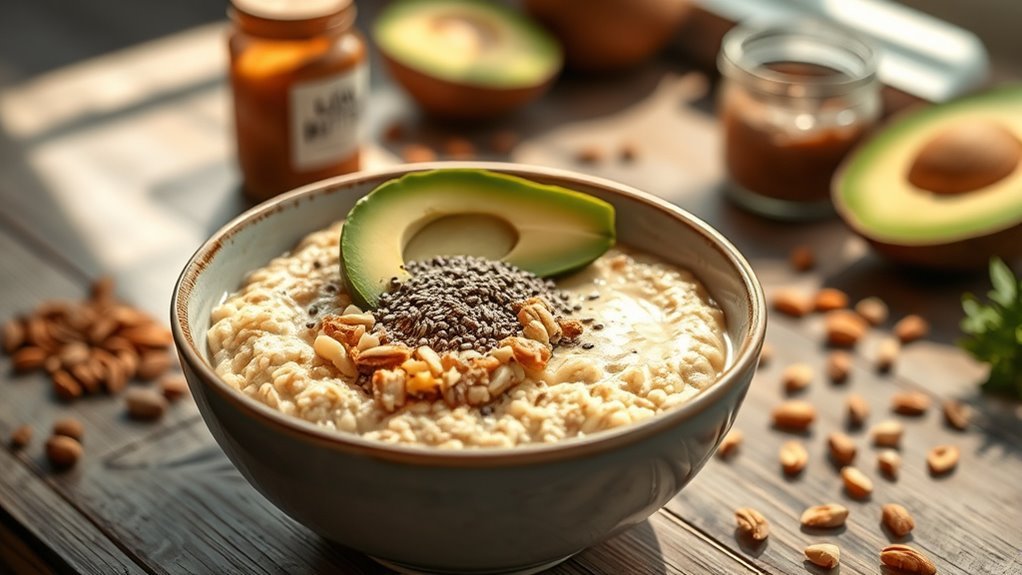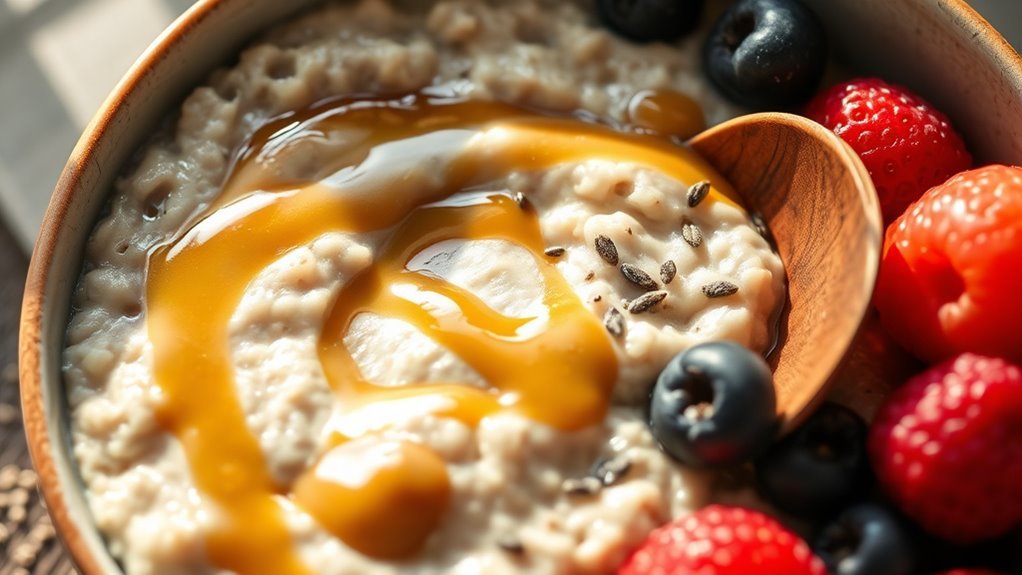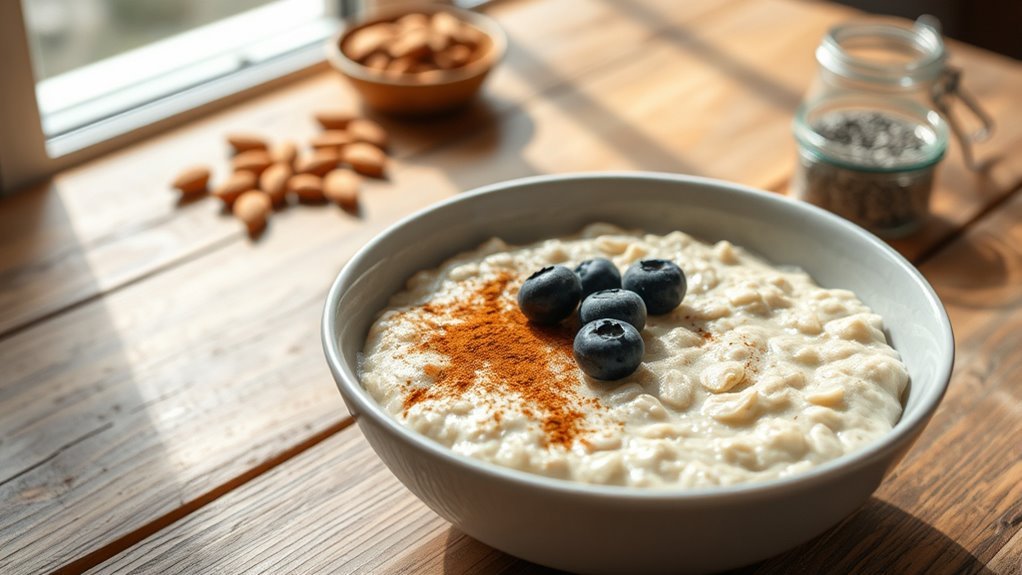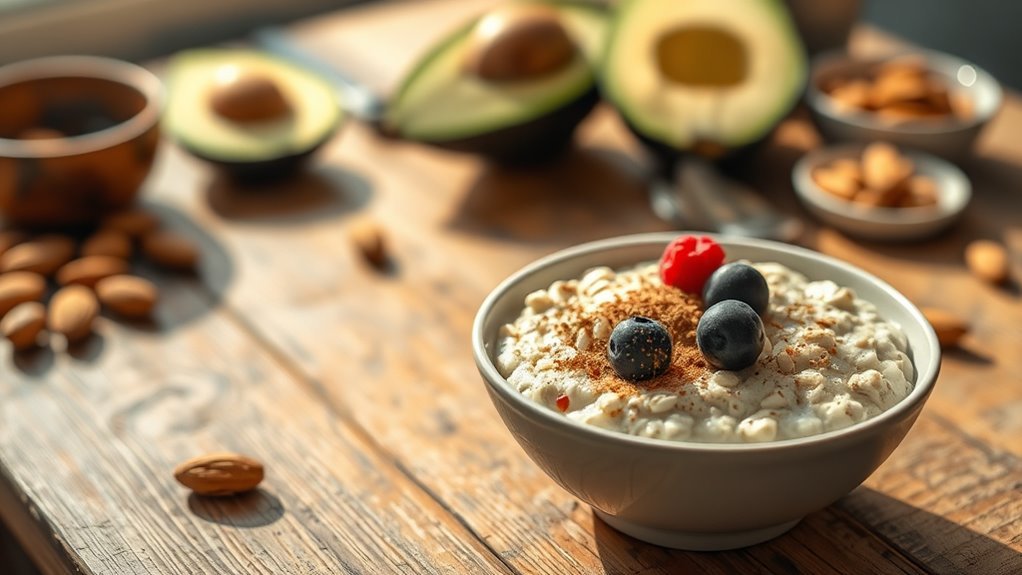Oatmeal isn’t ideal for a ketogenic diet due to its high carbohydrate content, with about 27 grams per cup. This can easily exceed your daily carb limit of 20-50 grams, potentially disrupting ketosis. Instead, consider low-carb alternatives like chia seed pudding, flaxseed meal, or coconut flour porridge, which can satisfy your breakfast cravings without the carbs. Want to explore more delicious low-carb options and tips for maintaining a keto lifestyle?
Understanding the Ketogenic Diet

When you’re exploring the ketogenic diet, it’s important to understand its fundamental principles, as this high-fat, low-carbohydrate approach aims to shift your body into a state of ketosis. Achieving this metabolic state requires a careful macronutrient balance, typically consisting of about 70-75% fats, 20-25% protein, and only 5-10% carbohydrates. This shift helps your body burn fat for fuel instead of glucose, promoting weight loss and improved energy levels. While the keto diet offers freedom from hunger spikes associated with high-carb diets, it’s essential to evaluate your individual needs and consult with a healthcare professional. By understanding these principles, you can make informed choices that align with your health goals while enjoying the benefits of the ketogenic lifestyle. Maintaining a daily carb intake of 20-50 grams is crucial for entering ketosis and sustaining its benefits.
Carbohydrate Content in Traditional Oatmeal

When considering oatmeal on a keto diet, it’s essential to look at its carbohydrate content. Traditional oatmeal contains a significant amount of carbs, which can easily exceed your daily limit on keto. Fortunately, there are alternative low-carb options that can provide a satisfying breakfast without disrupting your ketosis. Moreover, understanding the high carbohydrate content of oatmeal can help you make informed dietary choices while adhering to keto guidelines.
Oatmeal Carb Composition
Oatmeal, a popular breakfast choice, is often scrutinized in the context of low-carb diets like keto. When you look at traditional oatmeal, it typically contains about 27 grams of carbohydrates per cup. This can make carb counting a challenge, especially if you’re trying to maintain a strict ketosis state. While oatmeal is nutritious, its high carb content means it may not fit well within your daily carb limit on a keto diet. If you’re seeking oatmeal alternatives, consider options like chia seeds or flaxseed meal, which offer similar textures with considerably fewer carbs. Additionally, incorporating lower-carb alternatives can help you stay within your keto goals. Ultimately, it’s important to balance your nutritional needs and goals, giving you the freedom to choose what works best for your lifestyle.
Keto Diet Restrictions
For those following a keto diet, understanding carbohydrate restrictions is essential for maintaining ketosis. Traditional oatmeal is high in carbs, which can interfere with your ability to stay within the keto guidelines. Here’s what you need to take into account about its carbohydrate content:
- A typical serving of oatmeal contains around 27 grams of carbs.
- Most keto dietary restrictions recommend limiting carb intake to 20-50 grams per day.
- Consuming oatmeal can easily push you over your daily carb limit.
Given these facts, you’ll need to be cautious if you’re tempted by oatmeal. Tracking carbs can help you make informed choices while finding alternatives that align with your dietary restrictions and enjoy breakfast without compromising your keto journey. Make informed choices to support your goals while embracing freedom in your meal planning.
Alternative Low-Carb Options
While traditional oatmeal may be off the table for those on a keto diet, there are several low-carb alternatives that can satisfy your breakfast cravings without derailing your dietary goals. Consider options like chia seeds, flaxseed meal, or hemp hearts. These oatmeal alternatives not only provide healthy fats and fiber but also have notably lower carbohydrate content. You might also explore low carb grains such as almond flour or coconut flour, which can be used to create pancakes or porridge-like dishes. These options allow you to enjoy a satisfying breakfast while staying within your carb limits. Embracing these alternatives can keep your mornings enjoyable and aligned with your keto lifestyle, giving you the freedom to savor delicious meals. Additionally, understanding quinoa’s carbohydrate content is essential for making informed dietary choices, especially for those aiming for a low-carb diet.
The Impact of Oatmeal on Ketosis

How does oatmeal fit into the ketogenic diet? Unfortunately, traditional oatmeal can disrupt ketosis due to its high carbohydrate content. If you’re looking to maintain your state of ketosis, it’s essential to contemplate alternatives. Here are some points to keep in mind:
- Oatmeal typically contains around 27 grams of carbs per cup, which can exceed your daily limit on keto.
- While oatmeal substitutes like chia seeds or flaxseeds provide fiber and healthy fats, they considerably reduce carb intake.
- Opting for keto-friendly grains, such as almond flour or coconut flour, can help you create satisfying breakfast options without jeopardizing your ketosis. Additionally, understanding carb counts is crucial for aligning with dietary goals.
Incorporating these alternatives allows you to enjoy your meals while keeping your keto goals intact.
Low-Carb Alternatives to Oatmeal
If you’re searching for low-carb alternatives to oatmeal that fit within a ketogenic diet, several options can provide a satisfying breakfast without compromising your carb limits. Consider these low carb grains and their potential healthy toppings:
| Alternative | Healthy Toppings |
|---|---|
| Flaxseed Meal | Almond butter, berries |
| Chia Seeds | Coconut flakes, nuts |
| Shirataki Noodles | Cream cheese, cinnamon |
These alternatives not only keep your carb count low but also offer great textures and flavors. Flaxseed meal provides fiber and omega-3s, while chia seeds are rich in antioxidants. Shirataki noodles can mimic the feel of oatmeal with the right toppings, making your breakfast experience both enjoyable and keto-friendly. Additionally, choosing keto-friendly foods can enhance your overall diet while maintaining your desired carb limits.
Chia Seed Pudding: A Keto-Friendly Option
Chia seed pudding is an excellent keto-friendly option that offers numerous nutritional benefits, including high fiber and omega-3 fatty acids. You’ll find it easy to prepare, requiring just a few ingredients and minimal effort. With its versatility, chia seed pudding can be customized to suit your taste while keeping your carb intake in check. Additionally, you can explore local bakeries specializing in keto desserts for a sweet treat to accompany your pudding.
Nutritional Benefits of Chia
While exploring keto-friendly options, you might find chia seeds to be a nutritional powerhouse worth considering. Packed with essential nutrients, they offer numerous chia benefits that can complement your diet. Here are a few reasons to incorporate chia seeds into your meals:
- High in fiber: Chia seeds can help keep you full longer, supporting weight management.
- Rich in omega-3s: They provide healthy fats that promote heart health and cognitive function.
- Low in carbs: Perfect for a keto lifestyle, chia seeds can fit seamlessly into your daily macros.
In addition, their high fiber content contributes to maintaining stable blood sugar levels, enhancing overall health and well-being.
With versatile chia recipes, like chia seed pudding, you can enjoy a delicious, satisfying treat that aligns with your keto goals. Embrace the freedom that comes with nourishing your body effectively!
Easy Preparation Methods
Incorporating chia seeds into your meals can be as simple as preparing a delicious chia seed pudding, a perfect choice for those following a keto diet. This quick breakfast idea requires just three ingredients: chia seeds, almond milk, and your favorite low-carb sweetener. Simply mix them together, let the mixture sit for about 10-15 minutes to thicken, and enjoy!
Chia seed pudding is not only easy to prepare but also provides a satisfying alternative to easy oatmeal recipes. You can customize it with toppings like berries or nuts, keeping it keto-friendly. This versatile dish allows you to stay on track with your diet while enjoying a tasty treat, giving you the freedom to explore creative options without compromising your goals. Additionally, chia seeds are low in net carbs, making them an excellent option for keto meal planning.
Flaxseed Meal as a Breakfast Substitute
If you’re looking for a nutritious breakfast option that aligns with a keto diet, flaxseed meal can be an excellent substitute for traditional oatmeal. Packed with essential nutrients, flaxseed offers several benefits that make it a compelling choice:
- High in fiber: Flaxseed meal promotes digestion and keeps you feeling full longer.
- Rich in omega-3 fatty acids: These healthy fats support heart health and reduce inflammation.
- Low in carbs: A perfect fit for keto, flaxseed meal contains minimal net carbs.
You can easily incorporate flaxseed into various breakfast recipes, such as smoothies, pancakes, or as a topping for yogurt. With its numerous flaxseed benefits, you can enjoy a satisfying and healthful meal without straying from your keto goals.
Coconut Flour Porridge: A Delicious Option
Coconut flour porridge is a delightful alternative for those on a keto diet seeking a warm, comforting breakfast. This porridge is not only low in carbs but also packed with coconut benefits, including medium-chain triglycerides (MCTs) that can boost your energy levels. You can easily customize it with your favorite keto-friendly toppings.
Here’s a quick look at some porridge recipes:
| Ingredient | Amount | Coconut Benefits |
|---|---|---|
| Coconut Flour | 1/4 cup | High in fiber |
| Almond Milk | 1 cup | Low in carbs |
| Sweetener (e.g., erythritol) | To taste | Zero calorie alternative |
Enjoy this simple yet satisfying breakfast that keeps you aligned with your keto goals!
Tips for Satisfying Oatmeal Cravings on Keto
While traditional oatmeal is typically off-limits on a keto diet due to its high carbohydrate content, you don’t have to give up that warm, comforting breakfast experience entirely. Here are some tips to satisfy your oatmeal cravings using keto-friendly alternatives:
- Chia Seed Pudding: Combine chia seeds with almond milk for a creamy, nutrient-dense option.
- Flaxseed Meal: Mix flaxseed meal with water or nut milk, heating it for a porridge-like consistency.
- Coconut Flour: Utilize coconut flour mixed with butter and low-carb milk for a filling, oatmeal substitute.
These oatmeal substitutes can also double as tasty keto snacks throughout the day. With a little creativity, you can enjoy satisfying textures and flavors that keep your keto lifestyle on track while enjoying breakfast freedom.
Creative Add-Ins for Low-Carb Breakfast Bowls
When crafting your low-carb breakfast bowls, adding creative ingredients can elevate both flavor and nutrition. Consider topping your base with keto toppings like chia seeds or unsweetened coconut flakes for added texture. Incorporate breakfast spices such as cinnamon or nutmeg to enhance taste without extra carbs. Nut butters, like almond or peanut, provide healthy fats and protein boosts. You can also include low carb fruits, such as berries or avocado, for a fresh twist. For a creamy texture, explore dairy alternatives like coconut yogurt or almond milk. Sweetener options like stevia or erythritol can satisfy your sweet tooth without compromising your diet. Finally, use texture enhancers like crushed nuts or seeds to make your breakfast bowl truly delightful.
Frequently Asked Questions
Can I Eat Instant Oatmeal on a Keto Diet?
You can’t eat instant oatmeal on a keto diet if you’re aiming to keep your carb intake low. Instant oatmeal typically contains high levels of carbohydrates, which aren’t compatible with keto guidelines. Instead, consider keto alternatives like chia seeds or flaxseed meal, which offer similar textures and can be prepared quickly. They’re low in carbs and high in fiber, making them a great choice to satisfy your breakfast cravings without derailing your diet.
What Are the Symptoms of Oatmeal Affecting Ketosis?
If you include oatmeal in your diet, you might notice symptoms like fatigue, cravings, or weight gain, which can hinder ketosis. Curiously, studies show that just 20-50 grams of carbs can impact your state of ketosis. Oatmeal alternatives, like chia seeds or flaxseeds, can help you stay in ketosis without these negative effects. It’s all about finding the right balance and enjoying the freedom of your dietary choices while maintaining your goals.
How Often Can I Have Oatmeal on Keto?
You can have oatmeal occasionally on keto, but it’s best to limit it due to its carb content. Instead, consider oatmeal alternatives like chia seeds or flaxseed meal, which can fit better into your keto meal planning. These options provide fiber and healthy fats without kicking you out of ketosis. It’s all about balance, so enjoy oatmeal sparingly while prioritizing low-carb choices that align with your dietary goals.
Are There Gluten-Free Oatmeal Options for Keto?
Yes, there are gluten-free oatmeal options suitable for keto! While traditional oats can be high in carbs, you can explore alternatives like chia seeds, flaxseeds, or hemp hearts. These keto-friendly, gluten-free options provide similar textures and can be used in breakfast recipes. They’re low in carbs and packed with nutrients, allowing you to enjoy a satisfying meal without compromising your dietary goals. Embrace these alternatives for a delicious, keto-compliant start to your day!
Can I Sweeten My Keto Oatmeal With Sugar Substitutes?
Yes, you can sweeten your keto oatmeal with sugar substitutes! Healthy sweeteners like stevia, erythritol, or monk fruit are great options. They provide sweetness without the carbs and calories of sugar, helping you stay within your keto limits. Just be mindful of their effects on your taste preferences and digestion, as some may cause discomfort if consumed in large amounts. Experiment to find the right balance that suits your taste while keeping it keto-friendly!
References
- https://www.healthline.com/nutrition/oatmeal-on-keto
- https://www.ncbi.nlm.nih.gov/pmc/articles/PMC5822562/
- https://www.mayoclinic.org/healthy-lifestyle/nutrition-and-healthy-eating/expert-answers/oatmeal/faq-20058202
- https://www.webmd.com/diet/obesity/guide/keto-diet
- https://www.usda.gov/foodnutrition/food-systems/food-choices/oats
- https://www.ncbi.nlm.nih.gov/pmc/articles/PMC6520845/
- https://www.verywellfit.com/the-ketogenic-diet-5195421


